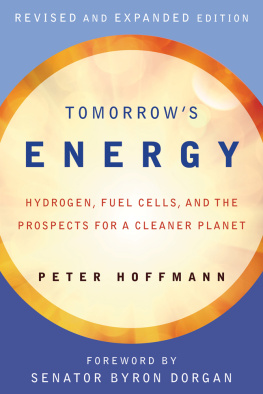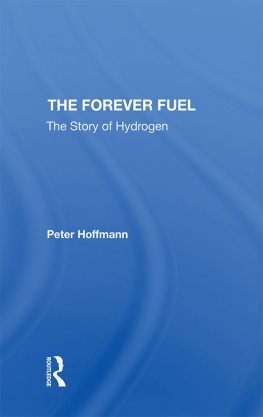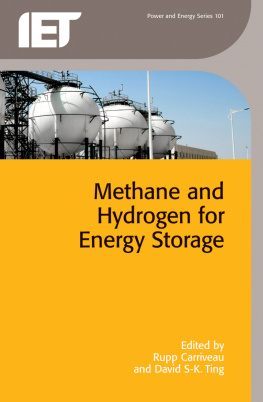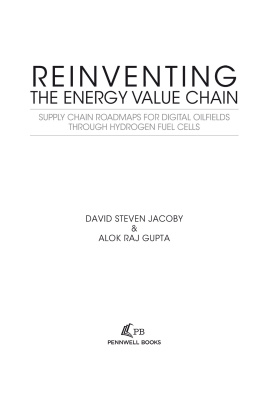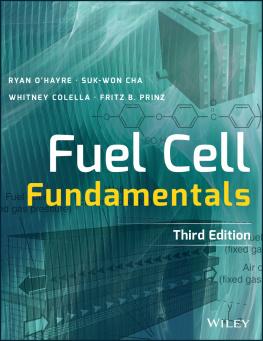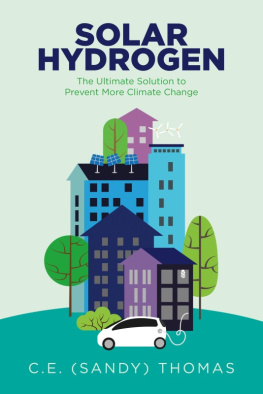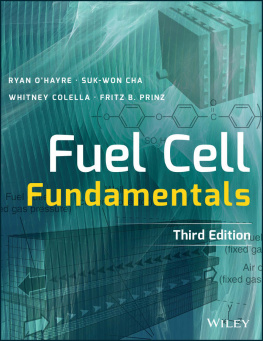Peter Hoffmann - Tomorrows Energy: Hydrogen, Fuel Cells, and the Prospects for a Cleaner Planet, Revised Edition
Here you can read online Peter Hoffmann - Tomorrows Energy: Hydrogen, Fuel Cells, and the Prospects for a Cleaner Planet, Revised Edition full text of the book (entire story) in english for free. Download pdf and epub, get meaning, cover and reviews about this ebook. year: 2012, publisher: MIT Press, genre: Politics. Description of the work, (preface) as well as reviews are available. Best literature library LitArk.com created for fans of good reading and offers a wide selection of genres:
Romance novel
Science fiction
Adventure
Detective
Science
History
Home and family
Prose
Art
Politics
Computer
Non-fiction
Religion
Business
Children
Humor
Choose a favorite category and find really read worthwhile books. Enjoy immersion in the world of imagination, feel the emotions of the characters or learn something new for yourself, make an fascinating discovery.
- Book:Tomorrows Energy: Hydrogen, Fuel Cells, and the Prospects for a Cleaner Planet, Revised Edition
- Author:
- Publisher:MIT Press
- Genre:
- Year:2012
- Rating:4 / 5
- Favourites:Add to favourites
- Your mark:
- 80
- 1
- 2
- 3
- 4
- 5
Tomorrows Energy: Hydrogen, Fuel Cells, and the Prospects for a Cleaner Planet, Revised Edition: summary, description and annotation
We offer to read an annotation, description, summary or preface (depends on what the author of the book "Tomorrows Energy: Hydrogen, Fuel Cells, and the Prospects for a Cleaner Planet, Revised Edition" wrote himself). If you haven't found the necessary information about the book — write in the comments, we will try to find it.
Peter Hoffmann: author's other books
Who wrote Tomorrows Energy: Hydrogen, Fuel Cells, and the Prospects for a Cleaner Planet, Revised Edition? Find out the surname, the name of the author of the book and a list of all author's works by series.
Tomorrows Energy: Hydrogen, Fuel Cells, and the Prospects for a Cleaner Planet, Revised Edition — read online for free the complete book (whole text) full work
Below is the text of the book, divided by pages. System saving the place of the last page read, allows you to conveniently read the book "Tomorrows Energy: Hydrogen, Fuel Cells, and the Prospects for a Cleaner Planet, Revised Edition" online for free, without having to search again every time where you left off. Put a bookmark, and you can go to the page where you finished reading at any time.
Font size:
Interval:
Bookmark:
Tomorrows Energy
Tomorrows Energy
Hydrogen, Fuel Cells, and the Prospects for a Cleaner Planet
Revised and expanded edition
Peter Hoffmann
The MIT Press
Cambridge, Massachusetts
London, England
2012 Massachusetts Institute of Technology
All rights reserved. No part of this book may be reproduced in any form by any electronic or mechanical means (including photocopying, recording, or information storage and retrieval) without permission in writing from the publisher.
MIT Press books may be purchased at special quantity discounts for business or sales promotional use. For information, please email or write to Special Sales Department, The MIT Press, 55 Hayward Street, Cambridge, MA 02142.
This book was set in Sabon by Toppan Best-set Premedia Limited. Printed and bound in the United States of America.
Library of Congress Cataloging-in-Publication Data
Hoffmann, Peter, 1935
Tomorrows energy : hydrogen, fuel cells, and the prospects for a cleaner planet/ Peter Hoffmann.Rev. and expanded ed.
p. cm.
Includes bibliographical references and index.
ISBN 978-0-262-51695-2 (pbk. : alk. paper)
ISBN 978-0-262-30048-3 (retail e-book)
1. Hydrogen as fuel. I. Title.
TP359.H8H633 2012
665.8'1dc23
2011030564
10 9 8 7 6 5 4 3 2 1
d_r1
Foreword
Senator Byron L. Dorgan
While policymakers in the United States struggle with the question of how to become less dependent on foreign oil and at the same time how to reduce greenhouse gas emissions, Peter Hoffmann once again reminds us about a solution that is all around us. It is hydrogen.
In 2001, Hoffmann wrote a book, Tomorrows Energy: Hydrogen, Fuel Cells, and the Prospects for a Cleaner Planet, making the case for the obvious advantages of hydrogen and fuel cells.
Hydrogen is our most abundant carrier of energy, analogous to and interchangeable with electricity. The use of hydrogen and fuel cells to power our vehicle fleet would give us access to a nearly inexhaustible energy medium that is nonpolluting. The exhaust coming out the tailpipe of a vehicle powered by hydrogen is nothing more than water vapor. Pursuing the employment of hydrogen and fuel cells as a fuel source is a win/win proposition for our country: we both protect the environment and reduce our dependence on foreign oil.
You might ask, if the case is that persuasive for hydrogen and fuel cells, why are we not engaged in a crash program to harness the widespread use of this fuel and technology?
The answer is complicated, but in short, the U.S. Department of Energy, after having been a strong advocate of a hydrogen future for more than a decade, has come to believe that commercial-scale use of hydrogen fuel cells is too far out into the future to be a reasonable, viable solution. Although that conclusion is not accurate, the department has severely curtailed, and in some cases eliminated, hydrogen fuel cell research in the past couple of years.
Hoffmanns new book, the revised and expanded edition of Tomorrows Energy: Hydrogen, Fuel Cells, and the Prospect for a Cleaner Planet, tells us how and why the DOEs position on hydrogen is just flat wrong. The fact is, automobile companies are working hard right now to bring commercial vehicles to the market powered by hydrogen fuel cells. In addition, fuel cells running on hydrogen as well as on other fuels such as natural gas or biofuel gases from wastewater treatment plants, for example, are now being sold commercially and are in fact being installed and used by the thousands, in buildings, forklifts, and much more in many parts of the world.
Around the time of publication of Hoffmanns 2001 book, both President Clinton and President George W. Bush saw great promise in developing hydrogen fuel cells. President Bush announced a major research push to commercialize this clean energy technology. And, frankly, a lot of progress has been made in both public and private sector research, as Hoffmann describes in this new book.
However, things changed when the Obama administration, in its first budget, decided to discontinue most of the federally sponsored hydrogen research. Energy Secretary Chu said that because research dollars are scarce, they should be used for technologies that are more near term than hydrogen fuel cells.
I felt the administration was misguided, and as Chairman of the Appropriations Subcommittee that funded the Department of Energy, I added back the funding that had been deleted from the presidents budget. That add back continued the federal research for another year, but the administration has not changed its views, and funding for hydrogenand fuel cell research remains in trouble.
The case for change in our energy policy is clear. And Hoffmanns new work describes why continuing working toward a hydrogen future is in our national interest.
Our country has only 3 percent of the worlds oil reserves, we are 5 percent of the worlds population, we produce 10 percent of the worlds oil, and we use over 20 percent of the worlds oil. In addition, about 50 percent of the oil we use comes from outside of our country, and 70 percent of our oil is used in transportation. All of this makes a strong case that if we are going to improve our energy security, we need to find ways to power our vehicles with something other than oil. The electrification of the vehicle fleet is the obvious direction. Included in that is a move to hydrogen fuel cell vehicles that are driven by electricity. Hybrids, electric, hydrogen fuel cell vehiclesthey are all part of the mix.
In some circumstances, new technology will get to the marketplace through the efforts of the private sector without help from government policy. But in the case of converting to a hydrogen fuel cell future, the issues of production, storage, distribution, and related matters require that public policy leads the way.
Those of us who believe that our country will benefit from a hydrogen/fuel cell future are indebted to Peter Hoffmann for his work over many years in support of this opportunity for Americas future. This second edition will be a major contribution to the debate about our energy future.
Senator Dorgan, Democrat from North Dakota, served in the United States Senate from 1992 to 2011 when he retired. Since then he has continued to work on energy issues as a Senior Fellow at the Bipartisan Policy Center in Washington, D.C., where he is cochairman, with former Senator Trent Lott (R-Miss.), of its energy project.
Preface and Acknowledgments
This revised and expanded edition of Tomorrows Energy continues to report on global developments and trendsboth advances and setbacksof the evolving hydrogen energy economy in the ten years since the first edition was published in 2001. It traces what has happened in this field roughly since the year 2000 while retaining much of the earlier material, including the discovery and early history of hydrogen and the late-twentieth-century efforts to harness hydrogen as transportation fuel for road vehicles, airplanes, and other uses. Today, more than ever before, the evolution of an energy economy based on nonpolluting, zero-emission hydrogen as fuel is both inevitable and imperative in light of worldwide concerns over energy security and global warming caused by carbon dioxide.
This edition covers the major aspects of production, storage, transportation, use as a utility fuel, and safety. It also touches on some of the recent political controversies in the United States surrounding hydrogenfor example, the views of Secretary of Energy Steven Chu versus those of hydrogen and fuel cell supporters and scientists in the United States and abroad, the findings of think tanks and major consultants, the National Research Council, and practically everybody else, including major carmakers and developers of European and Japanese hydrogen infrastructure plans, for example. It also introduces some concepts not widely known, such as hydricitythe essential interchangeability of electricity and hydrogenand prospects for both fuel cellpowered small aircraft as well as hydrogen-fueled hypersonic airplanes. Finally, it gives a glimpse of what some thinkers and practitioners guess may happen in coming decades.
Next pageFont size:
Interval:
Bookmark:
Similar books «Tomorrows Energy: Hydrogen, Fuel Cells, and the Prospects for a Cleaner Planet, Revised Edition»
Look at similar books to Tomorrows Energy: Hydrogen, Fuel Cells, and the Prospects for a Cleaner Planet, Revised Edition. We have selected literature similar in name and meaning in the hope of providing readers with more options to find new, interesting, not yet read works.
Discussion, reviews of the book Tomorrows Energy: Hydrogen, Fuel Cells, and the Prospects for a Cleaner Planet, Revised Edition and just readers' own opinions. Leave your comments, write what you think about the work, its meaning or the main characters. Specify what exactly you liked and what you didn't like, and why you think so.

